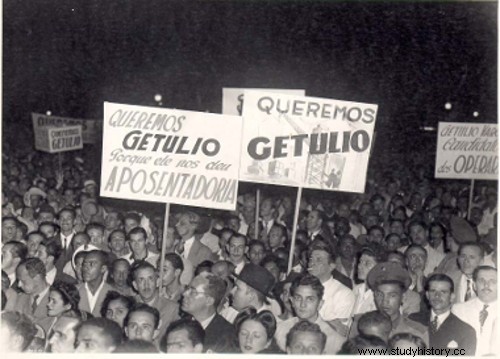
By Me. Cláudio Fernandes
Getúlio Vargas ascended to the Presidency of the Republic in 1930, with the so-called Revolution of 1930, and remained in that post until 1945 , when he was forced to step aside by the same military situation that had guaranteed him to rise to power. From 1937 to 1945, Vargas inaugurated the so-called Estado New, which consisted of a coup d'état within another coup (the 1930 Revolution) of which he was already a part. The various economic and social transformations undertaken in these long years of government, combined with heavy political propaganda, provided a popular clamor for Vargas to remain in power. These popular manifestations became known as “queremismo” .
The Era Vargas it was one of the most contradictory and most important periods in Brazilian history. Vargas developed a political skill that many authors consider Machiavellian, due to his versatility of articulation. Vargas maintained, for example, close political relations with Nazism and fascism and, at the same time, close economic relations with the United States. Labor policy and propaganda mechanisms are examples of these articulations.
Vargas developed Brazil's basic industry and also drafted a series of laws that guaranteed certain fundamental rights for workers. Associated with this, Getúlio also developed a complex propaganda machine that sought to exalt his figure, as was done in the totalitarian regimes of Europe. This contributed for the popular classes to idolize him as an idol, as a paternalistic figure.
In 1945, with the end of the Monday War World , Vargas began to be progressively pressured to open up his (then dictatorial) regime and give it democratic structures. As he had stopped supporting the Nazis during the war and had started to fight alongside the Western democracies, Getúlio could no longer maintain a system of government with authoritarian features. Thus, in 1945, there was an opening for the formation of new political parties and for a new electoral dispute.
In this process, Vargas sought to articulate with the PCB, after amnesting Luís Carlos Prestes, to try to remain in power through a new constituent. However, there was no space for Vargas to formally contest the elections, given that his stay in power was already very long and the candidate of his base was General Eurico Gaspar Dutra, one of the men responsible for the establishment of the Estado Novo.
This context gave rise to “queremism ”. The population, affected by the labor reforms promoted by Vargas and acclimated to the strong propaganda he had made around his own figure, clamored for him to remain in power. The military, realizing the risk of Vargas' permanence in power, forced him to resign in October 1945. It was the end of the Estado Novo.
* Image credits:CPDOC/FGV
